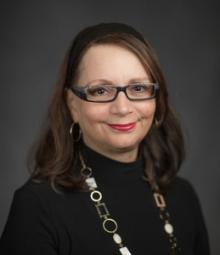Angela Panoskaltsis-Mortari, PhD
Angela Panoskaltsis-Mortari, PhD is a Professor of Pediatrics in the Division of Blood and Marrow Transplantation. She is also a Professor of Medicine in the Division of Pulmonary, Allergy, Critical Care and Sleep Medicine. Dr. Panoskaltsis-Mortari is the Director of the Cytokine Reference Laboratory, the Director of the 3D Bioprinting Facility at the University of Minnesota and Vice Chair for Research for the Department of Pediatrics.
Dr. Panoskaltsis-Mortari received her PhD from the University of Western Ontario. She was a post-doctoral fellow in the Department of Pathology at the University of Alabama and a post-doctoral research associate in the Department of Pediatrics at the University of Minnesota. She joined the University of Minnesota faculty in 1995.
Panoskaltsis-Mortari has board certification from the American Board of Medical Laboratory Immunology. She is a member of numerous immunology, pulmonary and hematology professional societies, and the author of over 250 articles which have appeared in such publications as Journal of Experimental Medicine, Journal of Clinical Investigation, Blood, Biology of Blood and Marrow Transplantation, American Journal of Physiology (Lung, Cell. & Mol. Physiol.) and Journal of Immunology.
Awards & Recognition
- Fellow of the American Institute of Medical and Biological Engineers (2020)
- Innovator in Basic Science Award, Department of Pediatrics, University of Minnesota (2020)
- Sara Evans Faculty Woman Scholar/Leader Award, University of Minnesota Office of the Executive Vice President and Provost and the Women's Center (2017)
Education
Vice Chair for Research and Professor, Department of Pediatrics
Faculty Member, Blood and Marrow Transplantation (BMT), Division of
Professor, Department of Medicine
Assistant Director, Earl E. Bakken Medical Devices Center
Director, University of Minnesota 3D Bioprinting Facility
Director, Cytokine Reference Laboratory
Associate Director, TL1 Program (CTSI)
Preceptor, Medical Scientist Training Program (Combined MD/PhD Training Program)
Post-Doctoral Fellowship in Pathology, University of Alabama, Birmingham, AL
Post-Doctoral Fellowship in Pediatric BMT, University of Minnesota Medical School, Minneapolis, MN
PhD, B cell regulation/Microbiology & Immunology, University of Western Ontario, London, ON, Canada
MSc, The University of Western Ontario, London, ON, Canada
Research
Research Summary/Interests
With 25 years of experience in animal models of stem cell transplant, lung injury, mesenchymal stem/stromal cell therapy and the biology of graft-vs-host disease (GVHD) after bone marrow transplant, Dr. Angela Panoskaltsis-Mortari’s work has evolved into the bioengineering field, and she is recognized as one of the thought leaders in lung bioengineering. Dr. Panoskaltsis-Mortari’s laboratory research focuses upon 4 major themes: 1) bioengineering the lung using adult stem cells and decellularized whole lung scaffolds with the goal of creating autologous lungs for transplant; 2) bioengineering autologous tissues such as trachea and esophagus using 3D bioprinting and customized hydrogels; 3) 3D bioprinting of cancer models; 4) enhancing proper lung repair and regeneration by manipulating the extracellular matrix using mesenchymal stromal cells and other cell therapy strategies.
Dr. Panoskaltsis-Mortari established and directs the 3D Bioprinting Facility at the University of Minnesota. She also directs the UMN Cytokine Reference Laboratory (a CLIA-licensed facility) and is board-certified by the American Board of Medical Laboratory Immunology. She is a member of the Stem Cell Institute, the Institute for Engineering in Medicine, the Lillehei Heart Institute, the Masonic Cancer Center and the Center for Immunology. She is funded by the NIH, has mentored many post-docs, MD trainees, graduate students and undergrads in various training programs, and collaborates with ARMI-BioFabUSA. Her goal is to realize the potential of regenerative medicine by converging the fields of stem cell biology, mechanical & biomedical engineering, biomaterials, physiology and surgery to bioengineer autologous tissues/organs for transplant using a patient's own cells that would not be rejected by their immune system.
Publications
Clinical
Board Certifications
- American Board of Medical Laboratory Immunology
